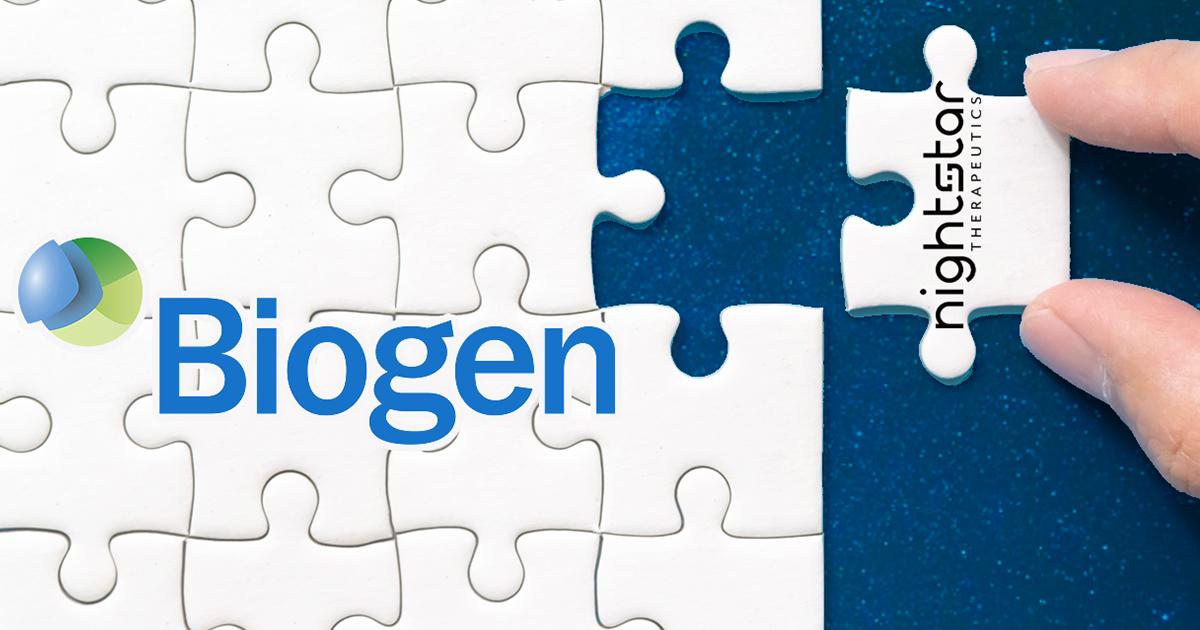Biogen Jumps Back into Ophthalmology Gene Therapy with Nightstar Acquisition

It didn’t take Biogen long to jump back into ophthalmology after announcing its intention in December 2018 to terminate a collaborative agreement with Applied Genetic Technologies Corp. Last week, about 11 weeks after nixing the AGTC deal, Biogen entered into an agreement to acquire another clinical-stage gene therapy company with promising programs in ophthalmology, Nightstar Therapeutics, based in Cambridge, MA, and London.
It turns out, Biogen never lost its desire to pursue adeno-associated virus gene therapies for ophthalmology. “Ophthalmology is an emerging growth area for Biogen and we believe this proposed acquisition aligns extremely well with our strategy and neuroscience pipeline,” Biogen CEO Michel Vounatsos said of the Nightstar bid on an analysts’ call last week.
The Nightstar acquisition is valued at $800 million. Biogen has offered $25.50 a share, a premium of about 68% over what the stock had been trading at before the offer was announced.
Nightstar vs. Spark
It may be no coincidence that this announcement comes so soon after Roche disclosed its $4.8 billion offer to acquire Spark Therapeutics. Nightstar has candidates in two disease areas – choroideremia and Stargardt disease – in which Spark also has programs. In choroideremia, Nightstar’s NSR-REP1 is in Phase III trials, whereas Spark’s SPK-7001 is in Phase I/II. Both companies’ candidates in Stargardt are in preclinical discovery. Of course, Spark has been out of the gate with its Luxturna (voretigene neparvovec-rzyl) for inherited retinal disease caused by biallelic RPE65 mutations, the first Food and Drug Administration-approved gene therapy for a genetic disease.
Nightstar Pipeline
Vounatsos and other Biogen executives mentioned ophthalmology a lot during that analysts’ call. In the call, Michael Ehlers, MD, PhD, Biogen’s executive VP of R&D, enumerated the Nightstar ophthalmology programs, beside those previously mentioned, that drew Biogen’s interest:
- NSR-RPGR, the subject of a Phase II/III trial for X-linked retinitis pigmentosa (XLRP).
- And preclinical programs NSR-BEST1 for Best disease, plus additional unnamed programs in retinitis pigmentosa.
“Within the world of gene therapy we believe there is a strong scientific rationale for sub-retinal delivery, which has already resulted in encouraging data for its clinical effects suggesting potential meaningful benefits versus natural history data,” Vounatsos said. “This transaction will accelerate our entry into ophthalmology.”
AGTC Moving On
AGTC CEO Sue Washer has already told OIS Weekly that her company is moving on after the disappointing results of its X-linked retinoschisis program and subsequent termination of the Biogen agreement. The firm is anticipating readouts from its programs in achromatopsia B3, achromatopsia A3, and XLRP trials, Washer said in a business update in February. Also, AGTC’s optogenetics partner, Bionic Sight, is expected to file an Investigational New Drug application with the FDA in the first half of the year, she added.
AGTC stock had bounced upward on the news of Roche’s acquisition of Spark Therapeutics, and since then has actually built on those gains after Biogen announced its bid for Nightstar. The stock has been trading at just north of $4, which is up almost 80% from its low of $2.28 days after the Biogen pullout.
Nightstar shares have been trading at close to the Biogen bid price of $25.50, while Biogen shares have slumped somewhat since the offer, down about 5% from $334.94 the day before the bid to around $317 on Wednesday.
For questions about this article, contact rich@healthegy.com.
